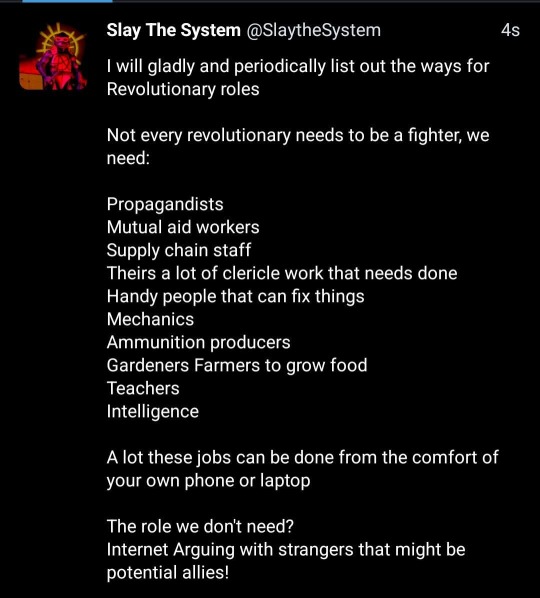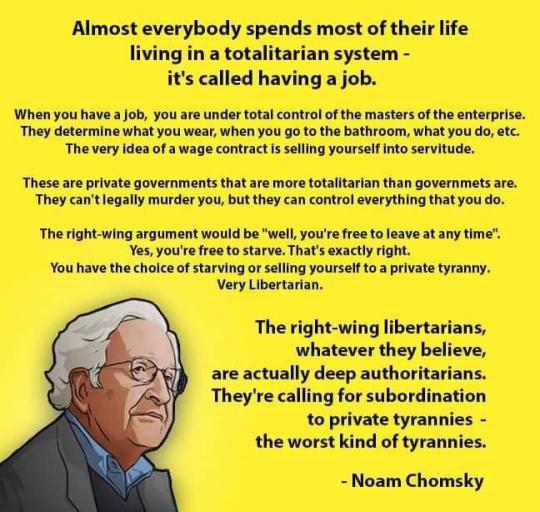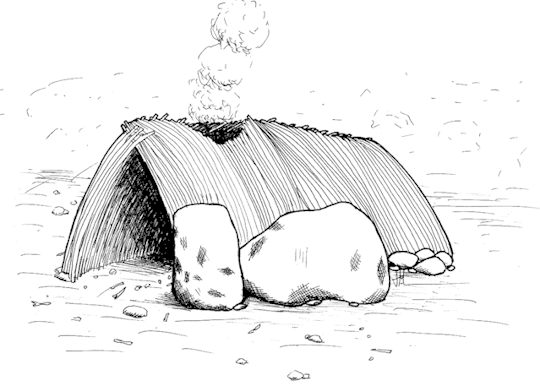#leftist theory
Explore tagged Tumblr posts
Text
What the fuck is this person talking about? Are they claiming that seeing Palestinians as humans *requires* seeing Israelis as non-human? What would it mean "to resolve the issue of human violence in a meaningful way"? Do they mean by slaughtering the people they take to be responsible for the violence they take to matter -- i.e., slaughtering all Israelis, including children (as Hamas did and does), to avenge the dead children of Gaza? What principle could possibly lead to the conclusion that "the bloodied remains of children" should spark our compassion and outrage only if they're Palestinian, and not if they're Israeli? That isn't "real" humanism; that's tribalism. That's zero-sum Us vs. Them thinking. But then, I suppose that's what they consider mature "Realpolitik" instead of what it really is: the same kind of childishness that Trump consistently displays.
Is diplomacy NOT "a meaningful way to resolve the issue of human violence"? Because those of us who oh-so-naively insist on seeing all humans as human and violence against any of them as bad also have enough historical awareness to know that the only thing that has ever resolved violence, short of the complete eradication or subjugation of one population, is diplomacy.
This characterization of Israelis and Palestinians as monoliths is utterly cartoonish. How can they support a claim that all Israelis delight in conquest? Because they saw some screenshotted social media posts on TikTok, probably with falsified translations of the Hebrew? Do they think that if they couch their bigoted stereotypes in enough pseudo-intellectual "decolonial" buzzphrases that will turn them into liberatory truths?
Seriously, the wording here sounds like they chewed up and regurgitated some Marxist, Postcolonial, and miscellaneous anti-liberal Theory half-digested -- especially their fifth paragraph, with that "denies entry into political thought" and "refuse the dilema [sic] imposed by the external world." Actually, that wording sounds suspiciously fascist... well, anti-liberals of various stripes can make common cause in their self-congratulatory Realpolitik and disgust at the naïveté of suckers who go in for consistent philosophical principles.
Finally, it should be noted that "damask" is not a verb. Possibly they meant simply "masks," but thought adding an extra syllable would make it sound more sophisticated. I see students do this constantly with using "within" when they just mean "in," but at least those have sufficiently similar meaning to result in mere silliness rather than nonsense.
(Not addressing the writer themself, because I have no interest in seeing how they would reply, and will block as soon as I reblog; I'm saving this for myself as an instructive example, and hoping it might be informative for others.)
“How can you call yourself a humanist and support Israelis?”
Well, you see, it’s really absurdly simple - Israelis are human beings and I’m against demonisation and dehumanisation and murder and rape and kidnapping being justified on the basis of where any human being happened to be born or calls home. That’s a pretty fucking baseline humanist position.
#leftist stupidity#leftist nonsense#philosophy#leftist theory#israel/palestine#i/p#humanism#anti humanism#anti liberalism
2K notes
·
View notes
Text
If the brutality of gilded age capitalism came in physical stress upon the body, the brutality of 21st century capitalism can be defined by the extent that the company is able to claim ownership over a worker's life.
#196#leftist#leftism#communist#communism#social justice#socialist#social commentary#writing#my writing#socialism#social media#history#anti capitalist#anti capitalism#antiwork#marxism#anarchy#anarchism#anarchist#anarchopunk#anarchocommunism#leftist theory#fuck capitalism#labor rights#labor#anticapitalist#capitalism#neoliberal capitalism#fuck liberals
91 notes
·
View notes
Text























#youth liberation#youth rights#leftblr#leftism#anarchism#anarchblr#anti school#anti capitalism#zine#zines#children's rights#internet archive#black liberation#antiracism#indigenous rights#praxis#leftist theory
47 notes
·
View notes
Text
Tbh I think the fast fashion conversation should involve poor ppl but not in any way in the form of shaming but more like: “you are being taken advantage of by large corporations that have women and children enslaved to make crappy clothes in excessive amounts that have literal lead that will damage ur body in serious ways that ur pressured to buy via influencers that form a parasocial relationship with you and don’t care about you to overconsume them in large amounts that won’t last and have to be thrown away at some point and all that ends up fucking the environment. Plus, the cycle of consumerism is damaging to ur finances to keep u in poverty and mental health of always wanting more but never satisfied.”
I am saying right now you don’t need to throw out fast fashion items you currently own, if they fall apart, they can be repurposed. I am also saying I’ve been guilty of shopping fast fashion but am also making a commitment to eliminate fast fashion purchases and mindset in my life. The root cause of these fast fashion corpos to keep doing what they do is purely based on you buying from them and you, the consumer in this capitalist world, have the power to change that. Obviously there’s little you can do to avoid big oil or buying things made with prison labor without serious direct action but the fashion industry is one that is by design meant to be maintained by mindless consumerism and overconsumption.
If you are poor, please do whatever within ur means to avoid fast fashion, whether it’s buying from thrift stores other than goodwill and just buying less clothes and focusing on more important things in ur life. A better tomorrow is still possible if you allow it.
#mine#gothgoth#deathrock#punk fashion#sustainable fashion#sustainability#trad goth#goth fashion#slow fashion#fuck fast fashion#punk#goth#anarcho punk#anarchism#anarchy#anarchist art#anarchist#anarchopunk#anarchofeminism#leftist theory#punk culture#goth culture#punk rock#counterculture#boycott divest sanction#boycott#working class#diy or die#diy#diy culture
288 notes
·
View notes
Text

"That silly robot thought kindness was a survival skill" FR tho, why is this movie lowkey based? also for maximum viewing experience, watch with your mother
#The Wild Robot#Wild Robot#Anarchism#Anarcho Communism#Ancom#meme#mom#kropotkin#peter kropotkin#they're the same picture#I saw this today and fell in love#Roz#fink the fox#Brightbill#rozzum unit 7134#fink#mutual aid a factor in evolution#mutual aid#leftism#leftist theory#gosling 0001#gosling 0186#robomom#socialism#anarchism#my post
147 notes
·
View notes
Text
and you know what, i need to see white and even poc leftists from non-usamerica posting about the imperial cores they live in and benefit from.
if you are a brit leftist making posts after posts damning america, calling us an imperial core, making your whole page #deathtoamerica, i need to see an equal amount of posts calling out your monarchy that has colonized millions of people. i need to see as much posts, if not more posts discussing how the uk was the groundwork for modern day colonization and imperialization world wide. how it was the uk that birthed western imperialism and it is still pockets deep in imperialism world wide.
same if you are spanish or french. i need to see you making posts about how your countries completely shattered the foundation of the world. how france is still forcing haiti to repay it for the revolution, despite you dumb white tankies acting like france is the epitome of a successful revoltionary model.
i need white/nonblack or indigenous brazilian tankies to discuss how they are currently living and benefitting from the deaths and oppression of indigenous and black braziliians. i need white braziliians to talk about how they too, live on stolen land, and benefit from white supreamcy and how they also live in an imperial core. yes, brazil, a country founded on slavery, and the murderer of indigenous tribes IS an imperial core. if you are a white brazillian you are benefitting from being part of a living, breathing, imperial core. same for white people in latin america in general.
i need non-black leftists from the UAE to start talking more about the rampant antiblackness and radicalized slavery in their countires, more than they talk about US america.
you are not exempt from benefitting from being pat of an imperial core just because you are not from us america. you are still benefitting from white supremacy if you live in a place that was formed by colonization, white supremacy, or is an imperial force.
if YOU are part of an imperial core, you need to be talking about that, how you benefit from being a part of that imperial core, and how that imperial core has harmed the rest of the world, and people in your community.
white uk leftists talk about us american more than i've ever seen them talk about the uk and i can go on.
#yankees#us politics#us imperialism#leftism#leftist#working class#communist#anarcho communism#anarchism#communism#socialism#marxism#marxism leninism#karl marx#socialist politics#marxist#marxist leninist#marxist theory#anarchocommunism#anarchy#communist theory#socialist#tankies#yankies#leftist theory#imperial core#us american#us american politics
25 notes
·
View notes
Text



If you don't follow @neolithicsheep on here, change that pronto.
#antonio gramsci#intolerant left#the revolution#bash the fash#leftist infighting#leftist theory#christofascists#antifascist#antifascismo#neolithicsheep
30 notes
·
View notes
Text

189 notes
·
View notes
Text
I‘m working on a translation from marxfem Alexandra Kollontais lectures about women’s material history, because I didn’t found an english version of the text and I think it should be aviable, even if I use deepl for the majority of it, due to my limited english skills. You can read it on my wattpad account, I just uploaded two lectures.
#alexandra kollontai#marxfem#marxist feminism#leftist theory#feminist theory#materialist feminism#materialism
27 notes
·
View notes
Text
The Case for Neutropian Anarchist Action
To classify and understand this text as what it is I disclaim that I am a poet and an activist; I am not an academic or philosopher and this text is inspired by a multitude of sources including the works of N.O. Bonzo, the life and labor of Ursula K. Le Guin as well as the writings of Antonio Gramsci.
There has never been a perfect solution and there never will be. History is full of examples of those seeking to establish utopia committing horrific acts in service to their belief that this would build a better world.
The future however is unwritten. It falls to us to step bravely into it, one tiny step after tiny step and one little act after the other.
I believe that as radicals we are chiefly motivated by two driving forces: hope and rage. We rage at a world and a system so unjust, cruel and destructive that at this point it is questionable if the human race will survive the next century and if we do many lifeforms that should have coexisted with us would be lost to the destruction that has been wreaked.
But beside anger that informs our actions stands another: hope. The idea that better world is not only possible but that there is no way but forward and there is no path but the one eventually leading there.
I find that too often we as left-wing radicals find ourselves tied up in the attempt to materialize utopia. I firmly believe that we must aim for utopia but our minds, souls and perception must stay in what exists today.
If utopia is to ever exist then it will not have been created in one swift motion. No singular act of insurrection and no one step forward will bring upon that which we seek.
Instead I believe that we should always look to utopia as our direction but focus our efforts on how we can make the world tangibly and immediately a better place for all that inhabit it in harmony.
All things have nuance and as anarchists we’re infamous for debates and discourse but I believe that a step in the right direction that is taken immediately may many times be better than a step taken precisely and calculatedly where we need to go after weeks of debate. People are suffering under this system and as radicals it is our responsibility to try and ease their pain.
This is not evangelism, I will not pretend that I have fully unlearned my Christian upbringing though I renounce it but regardless of it I still believe that there is merit in the idea of the Kingdom of Heaven which we must construct with our own hands.
Ask yourself what you can do for your community and those that surround you immediately rather than theorizing about utopia, take action now and from neutropian now the future will be built.
As anarchists we can work to make this world a kinder and more just place and on the days that we ourselves feel weak and powerless we can lean onto our comrades for support and comfort.
Every act of insurrection no matter how personal or small is a tiny step towards utopia, every civil disobedience, every hard question asked of supposed authority, every struggling community member taken care of by the community rather than taken by cops or institutions, these things, no matter how miniscule they seem when compared to the big issues choking this world are what moves us unerringly towards our goal.
Will we ever reach utopia? Does it matter? Is it not a worthy effort to make the world a little better each day that we have the power to do so? Is it not already a thing of beauty to build communities, networks of support, love, trust and mutual aid and reliant help? I truly believe that it is.
.SCRR
#anarchist#anarchist poet#anarchist art#anarcho#anarchy#practical anarchy#anarchism#anarcho syndicalism#anarchocommunism#anarchofeminism#anarchist theory#anarchist poetry#anarchist praxis#leftist#theory#leftist theory#le guin#writing#hope#hopecore#mutual aid#communism#community building#community#communist#communist poetry#anarcho communism#utopian#utopian anarchism#kropotkin
12 notes
·
View notes
Text
We Take Care Of Eachother
Fundraisers, news, philosphy, politics, signal boosting, mutual aid, and loud fucking opinions. AnCom Help Desk is a project that has been running for about 3 years out of Portland, Oregon. We help organize and share information, coordinate mutual aid, share information, and create spaces where kindness and community can thrive.
We also own and operate the Kelly Street Pantry here in Portland.
Donate here | Twitter | Website
#anarchism#leftist#anarchocommunism#communism#left wing#activist#mutual aid#politics#political#humanitarian aid#praxis#leftist theory#education
19 notes
·
View notes
Text









#youth liberation#youth rights#leftblr#leftism#anarchism#anarchblr#anti school#anti capitalism#zine#zines#children's rights#internet archive#praxis#leftist theory#pedagogy
27 notes
·
View notes
Text

Pre-Marxist communism refers to the historical, philosophical, religious, and social traditions and movements that articulated ideas akin to communism prior to the formulation of scientific socialism by Karl Marx and Friedrich Engels in the mid-19th century. These pre-Marxist traditions spanned from ancient communal practices to utopian socialist thought in the Enlightenment and early modern period. While lacking the materialist framework and class analysis central to Marxist theory, pre-Marxist communism often advocated for the abolition of private property, communal ownership of goods, economic and social equality, and collective labor, frequently grounded in moral, religious, or idealist justifications.

Long before the emergence of formal political ideologies, human communities engaged in communal practices rooted in survival, social cohesion, and the absence of surplus accumulation. In hunter-gatherer societies and early agrarian communities, collective ownership of land and resources was the norm. Anthropological and archaeological studies of Paleolithic and Neolithic societies reveal that many early human groups operated without permanent social hierarchies or formalized property systems. These egalitarian modes of existence, often termed "primitive communism" by later Marxists, were based on shared labor and mutual aid.
Such societies typically lacked private land ownership and instead organized around kinship and communal decision-making. Surpluses, when available, were distributed according to need, seasonal necessity, or customary norms. The advent of agriculture gradually led to stratification and private accumulation, but many early agrarian societies retained significant communal elements, such as collective irrigation systems and village-based landholding.

Various ancient religious and philosophical systems developed visions of social organization that reflected or idealized communal principles.
Early Christian communities, particularly as described in the Acts of the Apostles, practiced a form of communal living in which property was held in common and distributed according to need (Acts 2:44–45, 4:32–35). Inspired by the teachings of Jesus Christ, these communities emphasized moral equality, humility, and shared wealth. Church Fathers like Basil the Great and John Chrysostom criticized wealth accumulation and promoted almsgiving and community welfare, seeing poverty not as natural but as the result of social injustice. While not advocating systematic revolution, these teachings laid a moral groundwork for later critiques of private property.
In South Asia, both Buddhism and Jainism promoted monastic traditions based on communal living and renunciation of possessions. Monks and nuns lived in collectives where personal property was minimal or forbidden, and work was shared. While these traditions emphasized spiritual liberation rather than social reform, they proposed an alternative mode of life that rejected the accumulation of wealth and stressed ethical conduct and compassion for all beings.
Plato, particularly in his work The Republic, imagined an ideal society in which the guardian class shared property, spouses, and children to prevent corruption by private interest and promote unity. Though hierarchical and not democratic, Plato’s vision rejected private property among the elite as inherently divisive. Later philosophers like the Cynics and Stoics also expressed disdain for material wealth and advocated simpler, communal lifestyles.

During the feudal period, numerous peasant uprisings were driven by grievances against landowners, taxes, and inequality, often expressing proto-communistic ideals. The 1381 English Peasants’ Revolt and the 1525 German Peasants' War, although diverse in motivation, included demands for the abolition of serfdom, communal use of land, and egalitarian social structures. In many cases, these uprisings were infused with millenarian religious zeal, imagining a future egalitarian order as the fulfillment of divine justice.
Groups such as the Waldensians, Lollards, and Taborites challenged both Church and secular authority, denouncing wealth and advocating for a return to apostolic poverty. Among the most radical were the Anabaptists of the 16th century, especially in the Münster Rebellion (1534–1535), where leaders like Jan van Leiden briefly established a theocratic communal society. The community abolished private property and implemented common ownership, although it was also marked by authoritarian rule and violent suppression. Despite their failure, these movements represented early attempts to realize communal principles through collective action.
During the mid-17th century English Civil War, groups like the Levellers and Diggers emerged advocating political and economic egalitarianism. The Diggers, led by Gerrard Winstanley, established communal farms on common land, proclaiming that "the Earth was made a common treasury for all." While the Levellers focused more on democratic reforms, the Diggers explicitly opposed private property and the existing class structure. Their philosophical justification was both religious and rationalist, anticipating later socialist thought.

The 18th and early 19th centuries saw the emergence of utopian socialism, which, while not termed "communism" in every instance, laid the intellectual foundation for modern socialist and communist theory. These thinkers criticized capitalist inequality and private property, advocating various forms of cooperative or communal living.
A relatively obscure Enlightenment thinker, Morelly authored Code de la Nature (1755), which proposed the elimination of private property, inheritance, and money. In his ideal society, goods would be stored in public repositories and distributed according to need, with citizens working cooperatively in occupations suited to their abilities. Morelly’s work prefigured many elements of Marxist communism but lacked a theory of class struggle or historical development.
Although not a communist, Rousseau's critique of private property in Discourse on the Origin and Basis of Inequality Among Men (1755) deeply influenced later communists. Rousseau argued that the institution of private property led to the rise of inequality, domination, and moral corruption, and he idealized a more egalitarian, communal past.
Often regarded as the first revolutionary communist, Babeuf led the Conspiracy of Equals during the French Revolution, aiming to overthrow the Directory and establish a classless, egalitarian republic based on common ownership. Influenced by Rousseau, he advocated the abolition of private property and the organization of labor for the collective good. Although the conspiracy was suppressed in 1797, Babeuf's vision deeply influenced later communist movements and thinkers, including Marx.
Fourier imagined a society organized into small, self-sufficient communities called phalansteries, where work would be organized cooperatively and passions harmonized. He envisioned the abolition of wage labor and believed that human fulfillment required collective living and shared resources. Fourier’s ideas were often eccentric, but his critique of capitalism and advocacy for communal living were influential in 19th-century socialist circles.
A Welsh industrialist-turned-reformer, Owen implemented proto-communist practices in his factories and attempted to establish utopian communities such as New Harmony in Indiana (1825). He believed that character was shaped by social conditions and that cooperative living could create rational, moral individuals. While his communities failed, Owen became a leading figure in cooperative and early socialist movements in Britain.
Blanqui was a revolutionary who, while not a theorist of communism in the Marxist sense, advocated for a revolutionary vanguard to seize power and implement economic equality. His emphasis on insurrection and a temporary dictatorship of revolutionaries as a means to egalitarian ends had lasting influence on revolutionary strategy in later communist thought.

Although many of the aforementioned figures and movements held ideas akin to communism, the term "communism" itself began to gain more formal ideological identity in the early 19th century, prior to Marx and Engels.
The term communisme emerged in French political discourse during the 1830s and 1840s. Figures such as Étienne Cabet, Th��odore Dézamy, and Wilhelm Weitling began using it to denote visions of a society organized around collective ownership and equality. Cabet’s Icarians founded communal settlements in the United States, pursuing a practical application of his Christian-communist ideas as described in Voyage en Icarie (1840).
A secret revolutionary society founded by German émigrés in Paris, the League of the Just espoused radical egalitarian principles and called for the abolition of private property. It later evolved into the Communist League, under the influence of Marx and Engels, but its roots were firmly in the moral and religious radicalism of earlier pre-Marxist communism.
A German tailor and radical, Weitling combined millenarian Christianity with early proletarian consciousness. In works like Guarantees of Harmony and Freedom, he called for the establishment of a classless, communal society by means of revolutionary action. Marx later criticized Weitling’s moralistic and non-materialist approach, but he acknowledged his importance as a pioneer in worker-oriented communism.

Pre-Marxist communism encompasses a diverse array of traditions, movements, and ideas united by their opposition to private property, social hierarchy, and economic inequality. Whether rooted in religious doctrine, philosophical idealism, or utopian imagination, these early forms of communism laid the ethical and conceptual groundwork for the later development of scientific socialism. While lacking the historical materialist framework and systemic critique of capitalism that would define Marxist communism, these early expressions were nonetheless foundational in articulating humanity’s recurring aspiration for a more just and egalitarian society.
#communism#socialism#utopianism#pre marxist communism#utopian socialism#radical history#historical materialism#commune#early communism#egalitarianism#anarchism#political philosophy#political history#leftist theory#history nerd#revolutionary thought#marxist theory#class struggle#anti feudal#philosophy blog#social history#critical theory#anti oppression#intellectual history#diggers#levellers#early christianity#history community#post long read#tumblr think piece
9 notes
·
View notes
Text
next, i will talk about how a lot of european tankies are actually chuavanists. especially those who have pride in their countries/identities like france and england. both imperial cores and forces. both responsible for settler colonies and slavery.
#yankees#us politics#us imperialism#leftism#leftist#working class#communist#anarcho communism#anarchism#communism#socialism#marxism#marxism leninism#karl marx#socialist politics#marxist#marxist leninist#marxist theory#anarchocommunism#anarchy#communist theory#socialist#tankies#yankies#leftist theory#imperial core#us american#us american politics#french revolution#french resistance
12 notes
·
View notes
Text
rec me leftist theory
who here has leftist theory recs. please my crops are dying
i've already read and enjoyed capitalist realism by mark fisher, and im looking through some reddit threads on this theme, but recs from tumblr would be more than appreciated.
(the one qualifier i'll enforce is that to rec it you have to have read it/have to be in the process of reading it yourself)
#tag spam here we go#leftist theory#anarcho communism#anarcho socialism#leftism#anarchism#online leftism#political theory#reading recommendations#anarchist theory#socialist theory#8158
16 notes
·
View notes
